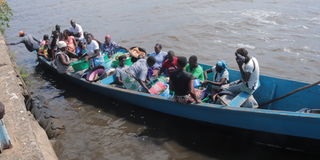A year after deadly boat accident, safety rules still ignored

Traders from Ndhuru in Suba North Sub-county board a boat at Homa Bay town pier for a journey back to their homes after days business on September 20,2022. Some of the boats used in the lake do not have life jackets which expose passengers to risks of drowning.
This month marks one year since a deadly boat accident at the Koginga beach in Homa Bay town that claimed 10 lives.
It is supposed to be a reminder to everyone using the lake that safety on the water comes first.
But putting on life jackets is not embraced though it is required by maritime agencies.
On September 21, 2021 a boat ferrying passengers and goods, including construction materials, left the beach for a 30-minute journey across the lake.
It was set to dock at the Ndhuru beach in Mbita sub-county.
But a few metres offshore, it was hit by strong waves and began drawing in water.
Terrified passengers started scampering for safety with nowhere to run to.
There was nothing they could hold on to as everything, including the boar itself, went under water.
Investigators said the wooden vessel had enough life jackets for everyone on board.
Lives could have been saved if its operators and the passengers were more keen on safety.
The passengers had failed to put on the orange-coloured safety vests, which were seen floating on the water after the boat capsized.
Government agencies, including Kenya Maritime Authority (KMA) and the Kenya Coast Guard Service (KCGS), started searching for the bodies of the dead.
Days later, the agencies intensified patrols on the lake to ensure that boat operators complied with safety standards as the accident gained national attention.
One year later, memories of the accident seem to have faded from the minds of people relying on boats for transport. More people have drowned after failing to comply with safety standards.
Seven boats every Wednesday
Every Wednesday, which is a market day in Homa Bay town, at least seven boats set sail from the Ngodhe, Kisaka, Sukuru, Alii and Kamwai beaches to the town.
Hundreds of traders board the vessels to sell chickens, charcoal, firewood and fish before buying soda, bread and supplies to take back to their villages.
Goods are often ferried on overloaded vessels.
Mr Japheth Agwa said his vessel, which operates between Koginga and Sukuru, can carry 40 passengers.
But he was carrying 50 passengers, each paying Sh150 one way, with some not wearing life jackets.
"I cannot force passengers to put on life jackets because they are adults who know that safety in water is very important," Mr Agwa said.
He also said he is in a business and kicking out a passenger from the boat for failing to comply with safety standards will lead to losses.
"Sometimes I carry more passengers than the number of life jackets I have. My boat has 40 life jackets, but sometimes I ferry up to 55 passengers," Mr Agwa said.
Some of the non-compliant passengers did not want to reveal why they did not like putting on life jackets.
As more boats docked at the beach, the Nation observed more people not complying with safety standards.
"Some of the safety gear is dirty at the collar and can lead to skin infection. I'd rather hold the jacket in my hand and put it on in case of an accident than to put it on throughout the journey," one passenger said.
Ms Josephine Atieno, a trader from Kisaka beach, said some of the available jackets are too small.
"Instructions on the jackets are that the gear should be tied around the body. This is impossible for people with large body size," she said.
Besides the mandatory floating device that the government requires for all boats, KMA and other agencies want all coxswains to get formal training at institutions regulated by the agency.
The training is meant to equip vessel operators with skills for navigating the lake.
Boat operators are also required to undergo medical tests to ensure they are fit to operate vessels. But boat operators said the requirements are expensive.
Mr Agwa said he is financially constrained.
"Most of us live from hand to mouth. I find it very difficult to spend an extra coin on training," he said.
Maj-Lt Bernard Mibei of the Coast Guard said action would be taken against vessel operators who fail to comply with safety rules.
Last week, officers from KCGS, KMA, Victory Farms and other organisations conducted a drill on responding to accidents between water vessels.
A water bus and a canoe were used to simulate how lives can be saved when vessels collide.
"Our mandate is to ensure safety in water. We have shown the beach officials how to respond to emergency cases," he said.
Vessel accidents can occur due to bad weather or carelessness among operators.
Mr Jacob Odanga, a search and rescue officer at KMA, urged vessel operators to comply with safety rules.
"Firms offering water transport services must ensure their safety response is enhanced," he said.





